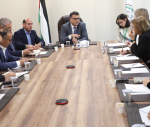You are here
Patriotism
Jul 25,2022 - Last updated at Jul 25,2022
My conflicted feelings about the Fourth of July were a long time in the making. In eighth grade I won a citywide speech contest, delivering remarks on patriotism to an audience including my proud parents. I rose through the ranks of the Boy Scouts, pledged the flag and hid with my classmates under desks during air raid drills. And I went to the annual Fourth fireworks displays, cheering in delight as they exploded overhead.
In my teens, my mother shared with me a box of letters from two of my uncles, both infantrymen in World War II’s European theater, recounting their experiences in the Battle of the Bulge, crossing into Germany, and entering concentration camps at the wars end. I devoured their correspondence, marvelled at their heroism, grieved for their lost comrades, and felt a profound respect for their sacrifice and sense of purpose. These experiences shaped my early years.
Those youthful feelings of patriotic pride, however, gave way in the mid-1960s as Americans wrestled with the legacy of our original sins against Black and Native Americans, and were challenged by the Vietnam war.
I opposed that conflict and watched too many of my generation drafted and sent to fight, die, or be physically or psychologically maimed in a conflict we never should have entered and served no purpose. Most disturbing was the recycling of themes evolved from our history of warfare, our War of Independence, the Civil War, and the two World Wars, to generate patriotic fervour: False claims that those sent off to die were “sacrificing their lives for our freedom”, “fighting tyranny”, or “fighting the enemy there, so we wouldn’t have to fight them here”.
Vietnam ended with 55,000 Americans and possibly one million Vietnamese dead. Another casualty was the naive patriotism of my youth.
One troubling event that changed my attitude toward the Fourth of July occurred in 1983. My wife and I were hosting a 12-year-old Lebanese girl, Fayzeh, a victim of Israel’s bombing of West Beirut during which a cluster bomb had shattered her leg.
On the Fourth of July, we took our family as usual to see the fireworks. As the show began, I will never forget Fayzeh’s reaction of terror, shaking and crying. What we saw as a wonder and a joy was to her a traumatic reminder of the nightly savage bombardments of her city. Realising our grievous error, we quickly got the children together and left. I’ve never felt the same about fireworks. Even when I see them at a distance, I think of Fayzeh and all the children living in fear of bombs.
This year’s Fourth had the added trauma of yet another mass shooting, this time at a parade in Highland Park, Illinois, leaving seven dead and dozens wounded. I had been invited to watch the fireworks display from the White House South Lawn. Though not enthusiastic about attending, as the day wore on, I decided to do what I had not in years and went. I’m glad I did.
As I walked around, looking less at the sky and more at the faces of those who had gathered, a different feeling came over me. I saw men, women and children of every race and creed. Some wore red, white and blue; others were decked out in their ethnic garb. As I passed, I could hear different languages spoken. Americans gathered at their White House, as other Americans gathered at similar events in parks or schools in thousands of cities and towns across this country. They came together to celebrate, not bombs or wars, but the freedom, opportunity and acceptance they or their ancestors had sought in this country. As I walked and watched, I felt good about my country.
Especially now, as our freedoms, opportunity, and acceptance of diversity are threatened, not by a foreign foe, but by violent fanaticism, greed, and intolerance, we must celebrate our American diversity and the aspirational values that brought us here and continue to move us forward. We need this kind of patriotism if we are to continue to flourish and become “the land of the free and the home of the brave”.
The writer is president of the Washington-based Arab American Institute











